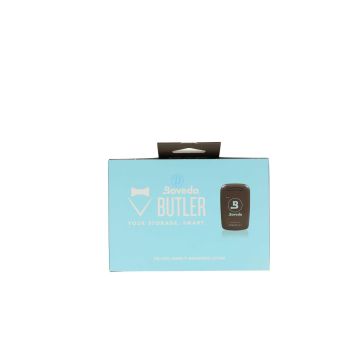Humidors
Imagine a world where the richest aromas and the most refined flavors are stored in a wooden box. This is no ordinary box but a humidor - the faithful guardian of cigars, the grandmaster in preserving their soul and character. Let's explore together the fascinating world of the humidor, an essential accessory for every cigar enthusiast. ??
Engaging blogs about Humidors

Fijne service en snel
Really a top tier site everything seems a bit fake but they have the best prices and a really fast delivery with trackingorder. Goated website big probs
The Cigar Humidor
Storing cigars goes beyond simply placing these refined creations in a box. It is an art and science rooted in a deep respect for the tradition and craftsmanship behind each carefully rolled cigar. Before delving into the technical depths of humidors, it is crucial to understand the 'why' behind this meticulous storage method.
Why would a bundle of dried and rolled tobacco leaves require so much attention and care? The answer lies in the delicate nature of the cigar itself, which, like a living organism, breathes and reacts to its environment. Without the protective embrace of a humidor, these precious rolls of tobacco would lose their spirit, their aromas would evaporate, and their flavors would flatten.
The Importance of a Humidor
A humidor is an essential tool for cigar enthusiasts as it ensures the proper humidity and temperature to store cigars in optimal condition. Here are some key reasons why cigars require specific humidity and how a humidor contributes to preserving their quality and flavor:
-
Humidity for cigars: Cigars are sensitive to fluctuations in humidity and temperature. They are typically stored at a humidity level of about 65-75% and a temperature of approximately 18-24 degrees Celsius. These specific conditions ensure that the tobacco leaves in the cigar do not dry out or become too moist, which can negatively affect taste and burn.
-
Consequences of too high humidity: If cigars are stored in an excessively humid environment, they can develop mold. This can lead to damage to the cigars and can be harmful to health when consumed. Moreover, excessive humidity can soften the taste of the cigar and make it difficult to burn.
-
Consequences of too low humidity: When humidity is too low, the tobacco leaves in the cigars dry out, resulting in a burn that may be too fast and uneven. This can cause a sharp, bitter taste and reduce the overall quality of the cigar.
-
The role of a humidor: A humidor is designed to maintain a constant humidity level and temperature inside. This is achieved by placing a moisture source, usually a humidification device such as a humidification stone or gel, inside the humidor and regularly replenishing it. This keeps the cigars in optimal condition, preserving their taste, aroma, and texture.
In short, a humidor is crucial for cigar enthusiasts because it creates the right environment to store cigars at their best. It helps prevent drying out or mold growth and contributes to maintaining the quality and flavor of cigars, making them more durable and providing a better smoking experience. It is essential to regularly check and adjust the humidity and temperature of the humidor to keep the cigars in top condition.
Different Types of Humidors by Material
Choosing the right humidor depends on personal preference and understanding the unique characteristics of the materials used. Here is an overview of the most common materials:
Wooden Humidors
Cedarwood:
- Naturally moisture-regulating and durable.
- Provides protection against tobacco beetles.
- Can impart a subtle cedar aroma to cigars that can enhance their flavor.
Mahogany and Cherry:
- Elegant appearance.
- Offer good humidity control.
Plastic Humidors
Acrylic Humidors:
- Transparent material makes it easy to view cigars.
- Lightweight and easy to maintain.
Plastic Travel Humidors:
- Provide protection during travel due to their shock-resistant and waterproof design.
- Compact and portable.
Preparing a Humidor
Step 1: Seasoning
- Lightly clean the interior with a soft cloth to remove any dust.
- Moisten the interior with a sponge or cloth dampened with distilled water. Be careful not to saturate; direct contact with cedarwood is not intended.
- Place a humidifier inside the humidor and let it remain closed for 24 to 48 hours to create a stable humidity environment.
Step 2: Setting Up the Humidor
- Assemble the hygrometer and humidifier following the manufacturer's instructions.
- Calibrate the hygrometer if necessary to ensure accurate humidity readings.
Maintenance and Monitoring
Step 3: Daily Check
- Inspect the hygrometer daily (initially) to ensure that humidity levels remain between 65-75%.
- Adjust humidity by adding more or less distilled water to the humidifier, depending on the measured values.
Step 4: Periodic Inspection
- Regularly check the condition of your cigars for signs of mold or tobacco beetles.
- Rotate the cigars by moving those at the bottom to the top for even moisture distribution.
Organizing and Storing Different Types of Cigars:
Step 5: Cigar Organization
- Sort cigars by strength and size. Keep heavier cigars separate from milder ones to prevent flavor transfer.
- Use dividers to keep different types of cigars organized within the humidor.
Conclusion
If you've come this far with reading, you're well on your way to becoming a true cigar connoisseur, complete with a beautifully arranged and maintained humidor. Remember that storing cigars is more than just laying down rolls of tobacco; it is a dedicated practice that ensures the preservation of taste, quality, and aroma. With a well-equipped humidor, a routine for regular checks, and a tactically organized collection, you create the ideal environment where your cigars can flourish.


